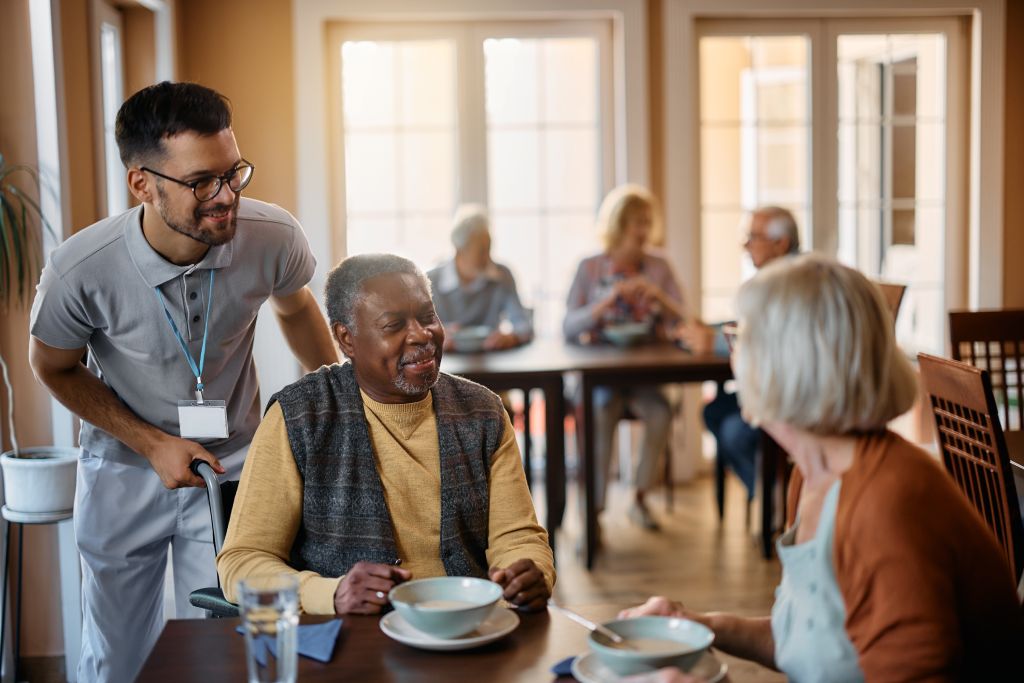Find animal-friendly Assisted Living homes for seniors who love animals.
Find animal-friendly Assisted Living homes for seniors who love animals.
Blog Article
The Relevance of a Comprehensive Program of Care in Assisted Living Settings
In assisted living settings, the application of a comprehensive program of care is important for resolving the multifaceted requirements of citizens. Such programs not only integrate medical and mental services yet additionally foster social engagement, which is essential for improving overall health. By focusing on customized treatment plans and entailing families at the same time, these programs can dramatically boost wellness results and high quality of life. The inquiry remains: what certain strategies can be utilized to make certain that these programs are properly tailored to satisfy the special needs of each resident?
Understanding Comprehensive Treatment Programs
As assisted living facilities remain to evolve, understanding extensive care programs becomes crucial for both locals and their families. Comprehensive treatment programs are created to attend to a vast array of demands for individuals staying in aided living settings, ensuring that each resident obtains tailored support that mirrors their special health problems and way of living choices.

Households play an indispensable duty in this procedure, participating in treatment preparation and recurring discussions to make sure that the resident's needs are continuously fulfilled. Understanding these programs is important for making informed choices regarding treatment choices and making best use of the quality of life for locals in assisted living facilities.
Advantages for Homeowners

(Dementia Care Charlotte)One primary benefit of extensive care is the renovation in health results. Regular surveillance and coordinated clinical treatment aid in the very early detection and administration of persistent problems, reducing hospitalizations and emergency situation interventions. Additionally, locals take advantage of improved social interaction, as structured activities and programs promote a sense of neighborhood, battling sensations of isolation and isolation.
Additionally, homeowners experience increased tranquility of mind, recognizing that specialist assistance is conveniently available ought to they call for support. This assurance permits them to focus on appreciating their daily tasks and keeping meaningful connections.
Role of Caregivers
Caretakers play a crucial role in the wellness of locals in assisted living centers, guaranteeing that their demands are met compassion and knowledge. They function as the key factor of get in touch with for homeowners, supplying essential support in daily tasks such as showering, clothing, and medicine management. Their visibility not only advertises physical wellness yet also improves emotional and social well-being by promoting connections improved count on and understanding.
Along with sustaining daily living jobs, caregivers contribute in keeping track of adjustments in homeowners' health and behavior. They are trained to recognize subtle signs of distress or decline, making it possible for timely treatments that can stop complications. Their expertise of each resident's one-of-a-kind history and preferences permits them to supply customized care, enhancing the overall top quality of life.
In addition, caregivers serve as supporters for residents, communicating their demands and choices to other healthcare professionals and family participants. This advocacy is essential in producing a holistic care setting that respects the dignity and freedom of each individual. Inevitably, the devotion and ability of caretakers are necessary parts of a comprehensive program of treatment, underpinning the success of assisted living settings.
Customizing Treatment Plans
While every local in assisted living has special requirements and choices, customizing treatment plans is vital to delivering effective and customized support. A one-size-fits-all strategy to care can neglect important aspects of specific wellness, potentially causing suboptimal end results. Memory Care. Consequently, a complete analysis of each homeowner's health standing, personal background, and way of living choices is vital in developing tailored treatment approaches.
The customization process entails partnership among health care experts, caretakers, and household members. By including input from all stakeholders, care strategies can deal with not only clinical needs however also emotional and social aspects that add to general top quality of life. Normal evaluations and updates to these strategies make sure that they stay relevant as homeowners' problems and choices progress gradually.
(Dementia Care Charlotte)Additionally, customized care plans advertise a feeling of self-respect and autonomy among residents, cultivating an environment where they really feel valued and appreciated. This customized approach not only enhances the performance of care yet also reinforces the partnership in between caretakers and homeowners, producing a helpful area atmosphere. Eventually, buying customized care preparation is a keystone of giving premium assisted living solutions that fulfill the diverse needs of citizens.
Enhancing Neighborhood Interaction
Building on the foundation of tailored care strategies, enhancing neighborhood involvement is an essential element of boosting the general experience for locals in assisted living (Assisted Living). Active participation in community tasks promotes social connections, battles feelings of weblink seclusion, and adds to emotional well-being. Helping with opportunities for locals to engage in group tasks, such as art classes, gardening, and workout sessions, develops a comprehensive environment that advertises interaction and partnership
In addition, incorporating homeowners into the broader area with collaborations with regional companies can give enhancing experiences, such as volunteering and participating in cultural occasions. This not just aids locals really feel valued yet also strengthens ties with the bordering community, enhancing their feeling of belonging.
Moreover, motivating family participation in neighborhood tasks is vital. Assisted Living. Relative can act as vital support group, aiding to bridge the gap in between homeowners and the neighborhood. Normal family events and open forums for conversation foster transparency and partnership, making sure that the care setting continues to be receptive to the demands of all stakeholders
Conclusion
In verdict, comprehensive treatment programs in assisted living settings play a crucial role in optimizing homeowners' wellness. The participation of family members in care preparation enhances support networks, fostering a sensible and autonomous living environment.
Report this page